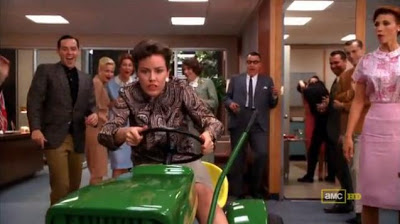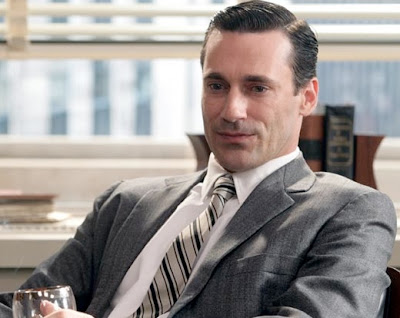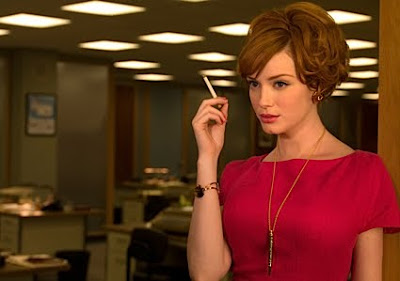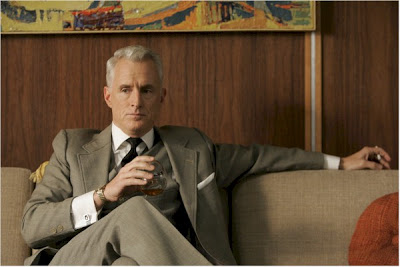(Warning: The following post contains heavy spoilers for the sixth episode of this season of “Mad Men”. If you watch the show, ensure you watch the episode before reading.)
Now, I believe that when people hear from a reputable source that a certain piece of art (movie, TV show, book, etc.) is “can’t-miss” per se, they’re subject to a curious combination of heightened anticipation and gnawing anxiousness. Expectations are obviously raised, but there inevitably comes a nagging sensation that those expectations somehow aren’t being met – not because the art isn’t actually providing a strong level of entertainment or pleasure, but because there’s a voice in the back of your mind asking, “Should I be enjoying this even more?”.
So upon hearing Pat’s news, I got quite excited, and I have to confess that for the first 40 minutes or so of the episode, I kept wondering if I might be missing something. (This is in no way a rebuke toward Pat – I may be spoiler-crazy, but I have no issues with someone who simply expresses his enthusiasm. Really.) It wasn’t that I wasn’t enjoying the episode (I certainly was); it was just that I was waiting for it to distinguish itself from the rest of the season’s exceptional caliber.
And then the secretary ran over the British guy’s foot with a lawnmower.
I mean, wow.
Was that not the most spectacular scene in the history of the show’s 32 episodes? I have to think so. (In terms of best episode, I’d probably still go with the second-season finale, but this one’s close.) The sheer lunacy of it all – the blood-spattered suits, the suave British guy suddenly dropping all vestiges of suavity (“For the love of Christ!”), and, you know, a secretary careening around the office on a freaking lawnmower – was spectacular enough. But the way it was set up – the way it completely and instantaneously quashed the pervading sense of dread that had suffused the first half of the episode – was simply extraordinary. With a lesser show, such a preposterous development might have felt forced. Here it somehow made perfect sense, because that’s the kind of random, how-the-fuck-did-that-happen? thing that can utterly eradicate even the most well-planned, bone-crunchingly corporate type of takeover that the Brits were about to implement. (As Roger later puts it, “Believe me, somewhere in this business, this has happened before”.)

But let’s not discount the first half of the episode, which was superb enough in itself. First, there’s Cooper’s violent misreading of the purpose for the Brits’ visit, believing they want to snatch Draper and drag him across the pond to London. What was fascinating about that is that it’s perhaps the first time we’ve ever seen Draper become genuinely excited about anything. He’s been asserting his authority on cruise control for years, and he knows he’s invulnerable, but has he ever really hoped for anything before?
That leads to the heart-wrenching shot of Draper lying awake in bed with a slight smile on his face (beautifully contrasted with Sally staring in fear at the newly installed nightlight, desperate for protection). I’d never seen Draper smile like that before, and as soon as we see it, we know the London idea is a mirage and that things will go badly. I’ve always believed that the greatest strength of “Mad Men” is its ability, despite a large ensemble, to compel us to sympathize with all of the characters, and watching that smile on Draper’s face (one of Jon Hamm’s finest moments as an actor), I felt such incredible pity for him. In the prior episode, Peggy pointed out – quite truthfully – that Draper had everything she wanted, and yet I still felt sadness for him here because it was the first time that he really wanted something, and he wasn’t going to get it.

Of course, befitting the show, Draper wasn’t the only character I pitied. Joan, poor Joan. It was bad enough when her pretty-boy husband turned out to be an evil rapist, but now he’s just a pathetic, incompetent would-be surgeon. That’s even more sad, but Joan’s painful realization (or confirmation, as hints had already been dropped) – that she won’t be able to run off and live the life of luxury with a rich doctor and a white picket fence – just happens to brutally coincide with Sterling-Cooper finally recognizing her for her service. When the British guy toasts her accomplishments and she breaks down in tears, I wanted to join her.

Hell, I even felt sympathy for Jared Harris’ character when he gets shipped off to India. It isn’t his fault that he’s such a schmuck – he’s just been toeing the company line. His disappointment after being appointed the company’s “snake-charmer” is entirely understandable, and his superior’s response (“Don’t pout. One of your greatest qualities is you always do as you’re told.”) somehow constitutes an act of wanton cruelty.
And how about that young British guy who was all set to take charge before John Deere intervened? What was interesting about him was that he reminded me strongly of Campbell, only in all of the best ways. Sure, he’s clearly a slick politician (delivering the same line of greeting to both Campbell and Peggy was a nice touch), but he somehow doesn’t seem unctuous or officious. He truly believes that he’s a corporate prodigy who will lead Sterling-Cooper to greatness. Hell, he probably is a prodigy – in his initial meeting the head honchos, Draper can’t find a bad thing to think about him (and as Roger points out, Draper judges everyone). But in the end, the British higher-ups treat him the same way they treated Jared Harris and callously dismiss his entire future (even Draper raises his eyebrows). Their justification? “He’ll never golf again.”
Of course, part of the pleasure of the episode was watching the Americans conquer their British masters against all odds, and the personified force of American vengeance – besides the lawnmower, of course – is Roger. Motivated by his exclusion from the new corporate hierarchy chart (or perhaps just because he’s always amused to see other people suffer), he reacts to the horror of the accident with sublime indifference. I don’t think I’m exaggerating when I say that the following exchange is the funniest in the history of the show:
Kinsey: “He might lose his foot.”
Roger: “Right when he got it in the door.”
That’s funny, but it also typifies Roger’s “Don’t fuck with me” attitude that likely led to his rise up the corporate ranks. Roger is a legitimate adversary – his bark has bite – and perhaps that’s why Draper actually says “Thank you” during the earlier scene in the barbershop. Draper hardly every thanks anyone, and he probably doesn’t mean it this time, but he recognizes it’s the safer play to mollify Roger rather than continually antagonize him.

(By the way, that aforementioned chart provides one of my favorite subtle moments in the episode. The British guy says that he, Draper, and Cooper are three equal department heads, but if you look closely, you can see that Draper’s name is positioned slightly below the other two; the line connecting his name to the British guy’s name is diagonal, indicating he’s a subordinate. Don’t think Draper didn’t notice.)
So what happens next? In theory, Sterling-Cooper can just go back to normal (I’m praying Joan is still prominently involved), although the accident will obviously have some minor immediate consequences. Regardless, I’m confident the show will continue to explore exciting new avenues of corporate strife while keeping its focus squarely on its characters, which is exactly where it should be.
Consider the lovely final scene in the episode, when Draper comforts Sally about her new baby brother. “We don’t know who he is yet, and we don’t know who he’s going to be,” he tells her. “And that is a wonderful thing.”
We may know what “Mad Men” is – the best show on television – but we never know where it’s going. And that, too, is a wonderful thing.
Jeremy Beck is the editor-in-chief of MovieManifesto. He watches more movies and television than he probably should.

Glorious. I loved the hard ass penny pincher in this episode too. Do you think at the end he was extending an olive branch to Don by buying him the Coke?
ps: The Peggy / Joan conversation right before the tractor incident was amazing. I hope Joan kicks her douchy doctor to the curb, and then goes to med school, or back to Sterling Cooper as a Media person, or something equally great.
pps; Don Draper went to my high school in real life! St. Louis people are just so attractive.
That's an interesting theory (by the way, it was a Dr. Pepper). I think he recognizes that, for better or worse, he and Draper are now going to have to coexist long-term. Still, I'm not sure it was an overt gesture of conciliation — British guys are always uber-polite, even when they're being nasty. I still see friction between the two down the line, similar to Draper's second-season battle with Duck, with Draper again coming out on top.
I loved that Peggy/Joan conversation as well. It's incredible to realize just how far Peggy has risen since her first day, and Joan's completely correct in saying she had a part in it. I also love the evolution of Joan's character. She seemed like a standard "Mean Girls"-esque queen bee in the initial episodes, and now she's one of my favorite characters on the show — beautiful and authoritative on the exterior, but profoundly sad and lost when no one is looking. I also think it's telling that she's one of the few people Draper actually seems to respect.
Did he smoke weed with David Lee? Also, you probably know that Jon Hamm is (more or less) married to Jennifer Westfeldt, better known as my girl Jessica Stein. Clearly those who attended your high school make sound romantic choices.